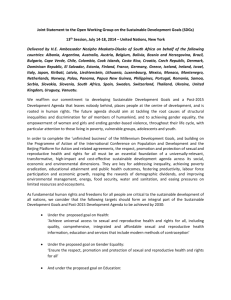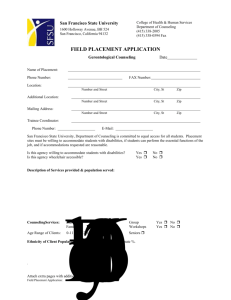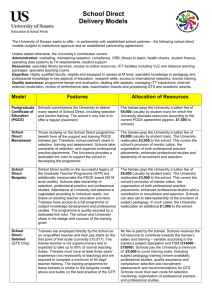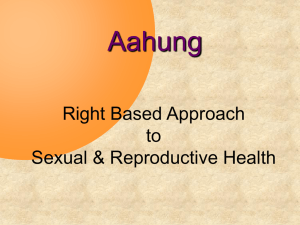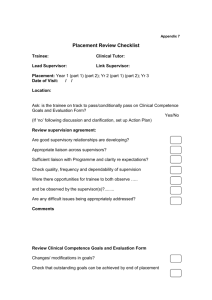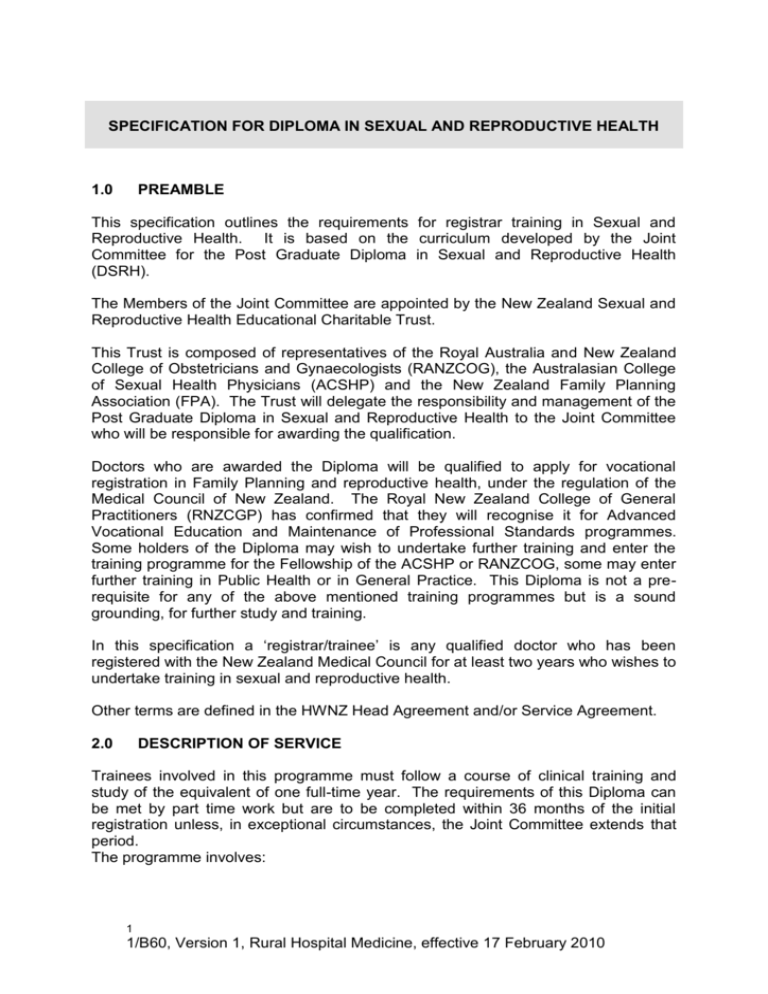
SPECIFICATION FOR DIPLOMA IN SEXUAL AND REPRODUCTIVE HEALTH
1.0
PREAMBLE
This specification outlines the requirements for registrar training in Sexual and
Reproductive Health. It is based on the curriculum developed by the Joint
Committee for the Post Graduate Diploma in Sexual and Reproductive Health
(DSRH).
The Members of the Joint Committee are appointed by the New Zealand Sexual and
Reproductive Health Educational Charitable Trust.
This Trust is composed of representatives of the Royal Australia and New Zealand
College of Obstetricians and Gynaecologists (RANZCOG), the Australasian College
of Sexual Health Physicians (ACSHP) and the New Zealand Family Planning
Association (FPA). The Trust will delegate the responsibility and management of the
Post Graduate Diploma in Sexual and Reproductive Health to the Joint Committee
who will be responsible for awarding the qualification.
Doctors who are awarded the Diploma will be qualified to apply for vocational
registration in Family Planning and reproductive health, under the regulation of the
Medical Council of New Zealand. The Royal New Zealand College of General
Practitioners (RNZCGP) has confirmed that they will recognise it for Advanced
Vocational Education and Maintenance of Professional Standards programmes.
Some holders of the Diploma may wish to undertake further training and enter the
training programme for the Fellowship of the ACSHP or RANZCOG, some may enter
further training in Public Health or in General Practice. This Diploma is not a prerequisite for any of the above mentioned training programmes but is a sound
grounding, for further study and training.
In this specification a ‘registrar/trainee’ is any qualified doctor who has been
registered with the New Zealand Medical Council for at least two years who wishes to
undertake training in sexual and reproductive health.
Other terms are defined in the HWNZ Head Agreement and/or Service Agreement.
2.0
DESCRIPTION OF SERVICE
Trainees involved in this programme must follow a course of clinical training and
study of the equivalent of one full-time year. The requirements of this Diploma can
be met by part time work but are to be completed within 36 months of the initial
registration unless, in exceptional circumstances, the Joint Committee extends that
period.
The programme involves:
1
1/B60, Version 1, Rural Hospital Medicine, effective 17 February 2010
•
1200 hours of clinical learning as trainees interact with patients under the
supervision of a recognised mentor, and attendance at case based tutorials.
•
Completion of a Log book in the core topics of family planning, medical
gynaecology and sexually transmitted infections.
•
Attendance at two recognised residential courses of minimum length 24 hours
each and 120 hours of weekly distance learning activities including private study and
clinical teaching to provide a theoretical framework, as a foundation for sound clinical
practice
•
Special topics chosen from a specified list of options
•
A final Examination
The theoretical modules will be provided by the Universities of Auckland and Otago
in which each trainee will be expected to enrol. These will include Medical
Gynaecology, Early Pregnancy, Sexually Transmitted Infections and Psychosexual
Counselling. The overall objective of the training is to ensure competence in skills,
knowledge and attitudes in sexual and reproductive health, which will involve both
personal and public health perspectives, and allow the graduate to contribute to the
development of policy and practice in the field.
2.1 Learning Environment
The training is based on an apprenticeship model of clinical training using sound
educational models of adult learning.
The training will take place in Public settings, typically hospital wards, operating
theatre rooms and outpatient clinics, primary care clinics and general practice
surgeries. Learning will also take place in laboratory settings, public health and
health promotion programme delivery. Academic learning environments will also be
part of the service (eg, lecture theatres, tutorial rooms and suitable medical libraries).
Clinics and Tutors providing training will need to meet criteria described by the Joint
Committee and approved by them for training. They will need to meet criteria around
the availability of a recognised tutor, minimum numbers of patients, and minimum
staffing levels, to ensure adequate supervision and support for the trainee.
Supervision will be provided by doctors with vocational registration in sexual and
reproductive health. Each trainee will also have a nominated mentor.
Learning in special topics can take place by observation in clinics by arrangement
with the relevant specialist in most cases. Trainees will have time allowed in their
service work for clinical tutorials, journal clubs and relevant grand rounds, at least
fortnightly.
2.1.1 Clinical Placements
General Requirements
The learning objectives as set out in the Joint Committee Handbook of
Training for the Diploma in Sexual and Reproductive Health need to be met during
the clinical placements and a record of leaning made in the Clinical Log book.
2
1/B60, Version 1, Rural Hospital Medicine, effective 17 February 2010
Clinical teachers will have the experience and qualifications to ensure that good
clinical learning shall take place.
The skills to be developed include but are not limited to:
General skills
Demonstrates the ability to understand, and communicate own values &
attitudes in regard to sexuality and sexual behaviour
Demonstrates understanding of the influences of culture, age, illness,
disability, class, and sexual orientation on sexuality and sexual
behaviour.
Demonstrates an understanding of the legal and ethical issues involved
in sexual and reproductive health.
Demonstrates an ability to take a sexual health history, urological
history, gynaecological history, contraceptive history
Demonstrates an ability to counsel and take a history from a sexual
assault victim
Demonstrates an understanding of the theoretical aspects of screening
Demonstrates ability to give injections and vaccinations and to manage
acute anaphylaxis including CPR
Communication and Counselling skills
Ability to counsel with regard to pre-pregnancy issues and pregnancy
choices.
Contraceptive counselling
Basic psychosexual counselling
Counselling surrounding issues in relation to STIs including herpes, HIV
infection and abnormal smears
Basic grief counselling skills
Knowledge of the principles of contact tracing
Motivational interviewing skills around safer sex behaviour
Communication skills with those of various cultures (eg, Maori, Pacific
Island nations, Asian nations, youth).
3
1/B60, Version 1, Rural Hospital Medicine, effective 17 February 2010
Examination skills
Demonstrates an ability to:
Perform a pelvic examination
Perform a speculum examination
Perform an examination in the first trimester and post abortion
Take a cervical smear
Collect appropriate specimens for screening and diagnosing STI’s
Perform a breast examination
Perform an examination of male genitalia
Teach testicular self-examination
Perform prostatic massage
2 glass, & 3 glass test
Fit a diaphragm
Fit a cervical cap
Fit a ring pessary
Fit an IUD including the Mirena IUS
Insert Implanon, and other hormone implants
Give a Depo Provera injection
Use a microscope to prepare and examine a wet mount, and Gram stain
Use of pH tape in diagnosis and screening
Perform a Whiff test
Perform a pipelle examination
Take a skin punch biopsy
Interpret lab results
Research Skills
Demonstrates:
Ability to evaluate clinical and epidemiological studies
An understanding of epidemiological principles
An understanding of audit and continuous self –evaluation
This may lead to the ability to write up results and publish a research paper.
4
1/B60, Version 1, Rural Hospital Medicine, effective 17 February 2010
Specific Requirements
Trainees will spend time in placements in Gynaecology departments of public
hospitals, Family Planning Clinics run by the NZFPA and Sexual Health Clinics in
public hospitals as follows:
Medical Gynaecology – 150 hours comprised of:
25 clinics- 100 hours
Ultrasound – 5 hours
Operating theatre sessions - as per log book – 15 hours
Acute admissions - as per log book – 30 hours
Family Planning clinic sessions – 400 hours
Sexual Health clinic sessions – 400 hours
Special Interest Points – Trainees will spend a minimum 250 hours in completing
special interest topics from the options listed below:
Sexuality
0-50
Dermatology
0-100
Breast
Urology
0-100
0-50
Public Health
0-50
Abortion medicine
0-100
Adolescent Health
0-50
Sexual Abuse Medicine
General Practice
0-50
0-100
Research topic
0-100
taking cases to a recognised
sexuality counsellor to discuss in
supervisory sessions
sitting in with a dermatologist/ doing
a dermatology clinic
sitting in with a specialist breast clinic
sitting in with a specialist urology
clinic
completing University paper in Public
health at Diploma level
sitting in with/doing Abortion clinic
sessions
sitting in with a specialist clinic / one
stop shop/adolescent outpatients
attendance at DSAC course
needs to be sessions involving
sexual and reproductive health
relevant to sexual and reproductive
health
2.1.2 Formal Teaching Programme
5
1/B60, Version 1, Rural Hospital Medicine, effective 17 February 2010
The Universities of Auckland and Otago will provide the formal teaching. Trainees will
be required to enrol in the following papers:
Early Pregnancy 712 - 2 points
Medical Gynaecology General 715 - 2points
Medical Gynaecology Special topics 716 - 2 points
Sexually Transmitted Infections - 2 points
Sexuality/Psychosexual Counselling - 2 points
Each point is equivalent to 12 hours teaching time. This teaching will take place as
weekly or fortnightly teaching by distance learning. These papers may be completed
in any order but must all be completed within a maximum of three years.
Attendance at two residential courses will be expected - one introductory and one
revisionary, both containing 24 hours teaching time.
The curriculum will be as developed by the Universities of Auckland and Otago staff
and approved by the Joint Committee and CUAP. Delivery will be by employees of
the Universities of Auckland and Otago.
There will be a minimum of 4 hours a week self directed study expected and not less
than one clinical tutorial of one hour per fortnight with the approved clinical tutor.
The examination will include OSCE and MCQ methods of examination and Clinical
Log Books must have been submitted and signed by the clinical supervisors
involved in training.
2.1.3 Access to Resources
Resources necessary for training require:
Access to public clinical settings as workplaces in gynaecology, family planning
and sexual health
Access to clinical settings in a variety of placements for observational learning
in special topics
Access to laboratory facilities
Access to libraries with the relevant reference books and journals
Access to diagnostic equipment such as ultrasound
Access to public health and health promotion programmes.
2.3 SUPERVISION
Supervision is necessary to guarantee quality of learning in the clinical context and to
ensure that clinical standards and safe practice are maintained in the workplace.
Supervisors will be approved by the joint committee.
Each trainee must identify a clinical tutor in the three core areas of learning.
6
1/B60, Version 1, Rural Hospital Medicine, effective 17 February 2010
Access to resources for training includes:
Facilities for teaching in a clinical setting.
Facilities for meetings, case discussion and group teaching sessions.
Equipment and therapeutic modalities appropriate to the specialty.
Access to ambulance transport services for pre and inter-hospital settings.
Access to diagnostic resources, including pathology and radiology services.
A library containing recognised texts and a relevant range of current journals.
The library may be accessed electronically.
High-speed Internet access to the University library and interactive teaching
websites as well as other web-based rural medicine teaching sites that may be
used (e.g. Australian College of Remote and Rural Medicine sites).
Telepaeds and other videoconferencing resources.
2.3.1 Clinical Supervision
In each workplace in which the trainee is providing clinical service as their
apprenticeship learning, there will be a supervisor who is identified who will hold
vocational registration in the field of sexual and reproductive health. This supervisor
will be required to answer questions the trainee may have about specific cases,
assist in practical skills and organisational and rostering matters. The main role of the
Clinical Supervisor will be to ensure clinical safety, act as a role model, and provide
brief feedback and teaching.
The trainee will carry the normal responsibilities of an employee in the workplace and
will follow the lines of accountability set out by that workplace.
A Clinical Supervisor will be able to supervise up to three trainees at any one time.
Each trainee shall in addition identify a clinical Mentor who will be responsible for
ensuring that the trainee is having enough experience to attain the skills required, is
reaching the learning objectives, is able to think critically and review his/her practice,
and assist the trainee to plan and organise special topic training.
The Supervisor will be responsible for signing the Clinical Log Book as a record of
skill attainment. Each trainee will have a Supervisor in each of the core skill areas.
The Supervisor will ensure that clinical case-based tutorials are provided for trainees.
Each mentor may have up to nine trainees at any one time. The Clinical Supervisor
may be the same person as the tutor in some situations.
The Mentor will be vocationally registered in the core area of sexual and reproductive
health and will hold a senior position in the service. They will be different from the
Clinical Supervisor.
General Requirements
The Clinical Supervisor will supervise record keeping, time keeping and clinical
situations. The Mentor will supervise skills, knowledge and attitudes and the
attainment of these in the learning environment.
7
1/B60, Version 1, Rural Hospital Medicine, effective 17 February 2010
The first 10% of clinics in the FPA and Sexual Health runs will be directly supervised.
Approximately 25% of clinical work will be directly supervised in the Gynaecology
run.
Trainees will be responsible to their clinical employer whilst working in Gynaecology,
Sexual Health and FPA. When doing observational learning in special topics they will
be responsible to their Mentor for achieving their learning objectives. The Mentor is
responsible to the Joint Committee in ensuring that the teaching and assessment
requirements are fulfilled.
Specific Requirements
There are no specific situations which require supervision, apart from the accepted
practice in the workplace of chaperoning for gynaecology examinations.
2.3.1 Educational supervision
The Mentor may also be the educational supervisor and provide guidance on
achieving learning objectives, integrating theory with practice, giving constructive
feedback, coaching for examinations, coaching for quality assurance and self-audit,
monitoring progress and coaching for examinations.
The Mentor will also give guidance in organising special topic learning, and
vocational guidance for ongoing career development. The Mentor will be responsible
for reporting back to the Joint Committee on the progress of trainees on an annual
basis.
See 7 Educational Supervision Quality Standard, for the responsibilities of the
Educational Supervisor.
3.0
PROGRAMME CO-ORDINATION
The members of the Trust will be responsible for co-ordination of the programme
nationally. These members will be specialists in their field and will be appointed by
their College/organisation.
The Trust will ensure that:
Information about the Diploma will be disseminated.
The organisation and administration of the Diploma will be performed.
Applications for training will be screened and approved or disapproved.
Recognition of prior learning will be assessed and approved or disapproved.
Clinical training placements will be approved.
Mentors and Clinical Supervisors will be approved and will ensure training
takes place in targeted areas, as appropriate.
Clinical Log Books will be assessed and accepted or rejected.
Audit and evaluation of training placements Clinical Supervisors and Mentors
will take place.
Liaison with Mentors, Clinical Supervisors and training placements will take
place including those for special topics.
8
1/B60, Version 1, Rural Hospital Medicine, effective 17 February 2010
HWNZ reporting.
3.1
EXPECTED OUTCOMES
3.1.1
Trainee outcomes
The trainee will have the knowledge, skills and attitudes recorded as attained in the
Clinical Log Book. The Clinical Log Book will be completed and evaluated before
entry is allowed into the final examination.
The trainee will pass the examination set by the Joint Committee of the Diploma.
This examination will be devised and set by the Joint Committee of the Diploma in
conjunction with the Universities of Auckland and Otago.
3.1.2
Client/Service Outcomes
The service and its clients will benefit by having culturally appropriate care from a
graduate who has been trained to have not only knowledge and skills but also a high
level of sensitive communication skills in the area of sexual and reproductive health.
3.2
ELIGIBILITY
3.2.1
Trainee eligibility
In order to be admitted to this programme of study a trainee needs to:
Have held a medical qualification as approved by the Diploma
committee for at least two years,
Hold current general registration with the New Zealand Medical
Council, and be a member of a recognised Medical Insurance Society,
Satisfy the Diploma committee that the trainee has appropriate
training and experience to undertake the programme of study,
A trainee must show that they are able to obtain employment in a recognised FPA
clinic, Sexual Health clinic, and Gynaecology Department for at least the required
number of hours during the year following registration for the Diploma.
A trainee should be a New Zealand resident, but exceptions may be possible on a
case by case basis, at the discretion of the Joint Committee and the Health
Workforce New Zealand.
3.2.2
Provider eligibility
The Joint Committee must approve all providers of training as meeting the criteria set
out in the Joint Committee Handbook of training for the DSRH.
9
1/B60, Version 1, Rural Hospital Medicine, effective 17 February 2010
4.0
LOCATION AND SETTING
Training will take place in public hospital and community clinics and laboratories, and
in some public health and health promotion programmes.
Any secondment of a trainee to another location for further training experience must
comply with Part 9 of the HWNZ Head Agreement.
5.0 ASSOCIATED LINKAGES
The Joint Committee and the training providers will have established links with:
Professional associations such as - Colleges of General Practice, Public
Health Medicine, Independent Nurse Practitioners Association
Accrediting body – the Colleges of Sexual Health Physicians and Obstetrics
and Gynaecology and FPA.
Medical Council
Maori
Auckland, Dunedin, Christchurch and Wellington Schools of medicine
Canterbury health sciences, Auckland and Otago universities
Patient Advocates for Code of Health and Disability Services Consumer Rights
and Privacy issues.
District Health Boards in which the clinical training units are set.
6.0 PURCHASE UNIT AND REPORTING UNIT
A training unit trainee formally enrolled in the training programme. Part time trainees
will be funded on a pro-rata training unit basis.
7.0 QUALITY STANDARDS: PROGRAMME SPECIFIC
This section should be read in conjunction with Schedule 1 Part 3 of the HWNZ Head
Agreement, which specifies generic quality standards for all programmes provided
under the contract.
Learning Environment Quality Standard
Each provider will demonstrate their commitment to training by:
Having policies in place, which detail the roles, responsibilities and limitations
for the trainees in the organisation.
Having written and implemented policies on cultural safety
Assessing and monitoring of the standards of supervisors
Provide placement appropriate to the trainees’ knowledge and experience, so
that the training can be graduated and ongoing.
Invite trainees to give feedback on their experiences annually
10
1/B60, Version 1, Rural Hospital Medicine, effective 17 February 2010
Regularly reviewing care to ensure it is in line with currently accepted
practice including knowledge of bi-culturalism, ethics, informed consent,
complaints and disciplinary procedures
Monitor that access to clinical resources are adequate and initiate action
when appropriate.
Clinical Supervision Quality Standard
Log books are signed and regularly reviewed to ensure a specified range of
clinical experience is obtained and to report any corrective action necessary
including depth and breadth of clinical experience available
Clear lines of clinical accountability for patient care at all times, with backup
available that is appropriate to the level of experience of the trainee.
Educational Supervision Quality Standard
Educational supervision will:
Ensure that all training requirements are met
Processes are in place to identify and take appropriate action for trainees
who require additional support, including advice on future options for that
trainee
Ensure that all trainees are able to have direct contact with the Joint
Committee if necessary
Regular meetings are held of all educational and clinical supervisors to
ensure they are well trained and they understand the objectives of the
training programme and supervision process
Programme Co-ordination Quality Standard
Regular meetings are held to evaluate and critically review the training
programmes.
All training is correctly assigned to each trainee, and proper records kept
Complaints and feedback about the programme are regularly sought and
received from trainees.
8.0 REPORTING REQUIREMENTS: PROGRAMME SPECIFIC
This section should be read in conjunction with Schedule 1 Part 1 of the HWNZ Head
Agreement, which specifies generic reporting requirements for all programmes
provided under the contract
11
1/B60, Version 1, Rural Hospital Medicine, effective 17 February 2010



